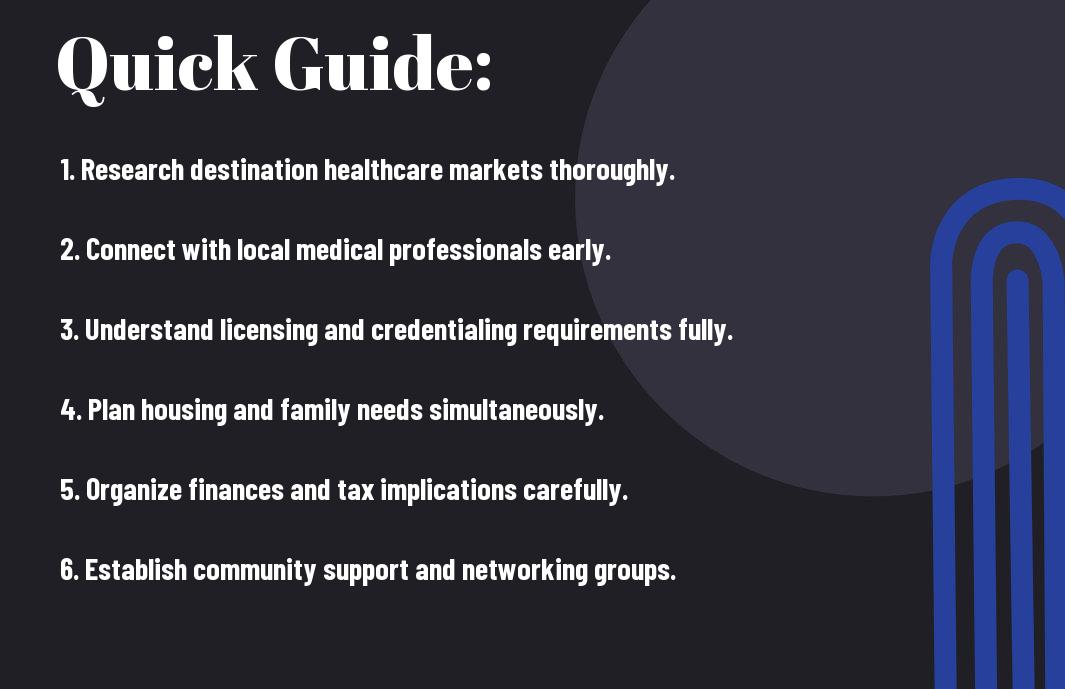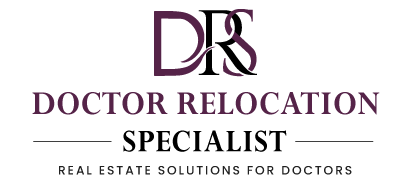Physicians often face unique hurdles when relocating for new opportunities, from finding the right community to transitioning their practice. In this comprehensive guide, you will explore key considerations and practical strategies to ensure a seamless move. You’ll learn how to assess job offers, understand the licensing process, and navigate personal adjustments, all while prioritizing your career goals and lifestyle preferences. Equip yourself with the knowledge you need to make your relocation a successful and positive experience.

The Emotional Terrain of Moving: What to Expect
Relocation involves more than just physical logistics; it stirs a whirlwind of emotions that can catch you off guard. You may find excitement mingled with anxiety as you prepare for a new chapter in your professional life. The transition can trigger feelings of nostalgia for your current surroundings and uncertainty about embracing change, making it imperative to acknowledge and accept these emotions as part of the journey.
Anticipating the Mental and Emotional Challenges
Expecting a range of emotions is part of the process, and recognizing them can help you navigate the transition more smoothly. You may experience sadness over leaving familiar colleagues and friends, fear about adapting to a new practice environment, or even stress related to uprooting your family. Channel these feelings into positive actions, like planning your move strategically or exploring your new community in advance.
Building a Support Network Amid Transition
Establishing a reliable support network as you transition can make all the difference in your adjustment period. As you approach this significant life change, reach out to professional contacts, former colleagues, or local physician groups in your new area to foster connections. Engaging with your new community through social activities or volunteering can also help you forge relationships and ease integration. Having people who understand your challenges will provide you with emotional backing and practical advice during this transitional phase.
Building a strong support network is especially vital as you may encounter unique pressures in a new practice setting. You could look for local physician organizations or online forums specific to your specialty, which not only allow you to share experiences but also open doors to mentorship opportunities. Attending networking events or joining local community groups can accelerate your acclimatization, ensuring you feel less isolated and more supported. Whether it’s cooking together with new neighbors or joining local clubs, fostering these relationships will help you navigate your emotional terrain effectively, ultimately enabling a smoother transition into your new environment.

Evaluating New Locations: Beyond Job Offers
Deciding where to relocate involves more than just job offers. Assessing various locations requires a holistic view that weighs personal, professional, and lifestyle factors. You’ll find that each community has its unique characteristics, opportunities, and challenges. Delving into the nuances of a new location will help you align your career ambitions with your personal values and family needs.
The Importance of Healthcare Community and Culture
Understanding the healthcare culture of a potential new location can greatly influence your job satisfaction. Engaging with local healthcare providers, community health initiatives, and medical organizations fosters relationships that enhance both your professional network and your personal sense of belonging. You’ll want to gauge how your values align with the community’s priorities in healthcare delivery.
Assessing Cost of Living and Lifestyle Factors
Your quality of life hinges significantly on the cost of living in a new area. Evaluating housing, transportation, grocery prices, and other daily expenses will provide clarity on your financial landscape. This evaluation ensures that your salary adequately supports your lifestyle preferences. Key elements to consider include housing markets, average utility costs, and availability of recreational activities.
- Research the average rent prices or home costs in the area.
- Compare commuting options and associated expenses.
- Look into local amenities, including grocery stores and recreational facilities.
- Your overall health and happiness correlate with the lifestyle factors you assess.
A clear understanding of cost implications is vital. Not just housing prices, but also taxes, healthcare costs, and daily expenses contribute to your financial well-being. Explore neighborhoods that cater to your lifestyle through proximity to parks, cultural activities, and social gatherings. Establishing these connections early can ease the transition for you and your family.
- Consider transportation options and their associated costs.
- Investigate local taxes that might impact your income.
- Evaluate child care and education expenses if you have children.
- Any additional amenities or lifestyle preferences can shift your budget significantly.
Mastering the Logistics of Relocation
Successfully relocating as a physician requires careful planning and coordination. Start by outlining a timeline that includes contacting moving services, securing housing in your new location, and ensuring that your family’s needs are met during the transition. Balancing these elements can minimize stress and maximize efficiency, allowing for a smoother adjustment to your new work environment and community.
Navigating Licensing and Credentialing in a New State
Securing licensure in your new state is important and can often be a lengthy process. Each state has different regulations and requirements, so it’s wise to start this process as soon as possible after accepting your new position. Research the necessary applications, fees, and timelines, and gather all pertinent documentation early. Various interstate compacts may ease this process, depending on your specialty and location.
Essential Tips for Moving Family and Personal Belongings
Relocating your family and personal items goes beyond packing and hiring movers. Create a comprehensive inventory of your belongings and determine what can be sold, donated, or moved. Establish a communication plan to keep everyone informed and agree on a budget to avoid financial surprises. Transitioning smoothly to a new home also involves logistic details like scheduling utility setups and researching new schools or community resources.
- Create a moving checklist.
- Schedule utility cut-offs and activations.
- Inform schools and local services of your move.
- Establish a timeline for packing and moving.
- Decide whether to hire professional movers or do it yourself.
The more organized your approach, the less chaotic the transition will be. Prioritizing tasks, utilizing digital apps for reminders, and engaging family members in the planning can streamline the relocation process, ensuring that moving day is as stress-free as possible.
- Inventory belongings thoroughly.
- Research moving services and negotiate costs.
- Pack strategically, labeling boxes and using protective materials.
- Keep valuable and important items with you during the move.
- Engage local resources for settling in and local area information.
The aim is to focus on logistics while considering your family’s emotional needs and well-being during this significant change. Having designated family roles in the relocation process can also foster a sense of teamwork and shared responsibility, easing potential tension.
Financial Considerations: Making Your Move Worthwhile
Your relocation as a physician can signal an exciting new chapter, but understanding the financial landscape is vital to make it worthwhile. From relocation packages to unexpected expenses, you should approach your finances with a strategic mindset. This involves careful budgeting, assessing costs of living in your new area, and taking advantage of any financial incentives offered by your new employer. Ultimately, a thorough financial plan can ease the transition and position you for success in your new environment.
Understanding Relocation Packages and Negotiating Terms
Relocation packages can vary significantly from one employer to another, so you’ll want to review the specifics of what’s included. Common offerings include moving expenses, temporary housing allowances, and assistance in selling your current home. You have every right to negotiate the terms of your package to ensure that it meets your unique needs and that you’re adequately compensated for the challenges of relocating. Knowing market averages can help you build a case for what you require, so do your homework before entering negotiations.
Planning for Tax Implications and Financial Pitfalls
Tax implications often accompany relocations, especially with moving expenses. Depending on your circumstances, some costs may not be tax-deductible, unlike previous years when relocation costs were more favorably treated. Familiarize yourself with IRS regulations to avoid surprises come tax season. Additionally, financial pitfalls can arise from underestimating living costs or overlooking potential changes in your salary based on your new location. Consulting with a financial advisor experienced in physician relocations can provide insights tailored to your situation, helping you strategize effectively.
When moving, anticipate the impact of state income taxes, property taxes, and variations in healthcare reimbursements that could affect your finances. For example, relocating to a state with no income tax can benefit your overall earnings, while higher property taxes may cut into your budget. It’s also advisable to consider the cost of living adjustments, as some regions have significantly higher housing and utility costs compared to others. A comprehensive understanding of these factors can help you avoid unexpected financial burdens and facilitate a smoother transition into your new role.
Building a Lasting Professional Network in a New Area
Establishing a strong professional network in a new location is crucial for your career growth and success. Engaging with local physicians and healthcare providers can lead to valuable collaborations, mentorship opportunities, and referrals. Focus on both formal and informal interactions to create a robust support system that enhances your professional life and community involvement.
Strategies for Making Connections Quickly
Participating in community events and medical seminars is one effective strategy for rapidly expanding your network. Make it a priority to attend local fundraisers, volunteer opportunities, and meetups tailored to healthcare professionals. Engaging in these events fosters personal connections, allowing you to develop rapport and trust within the local medical community.
Leveraging Professional Organizations and Conferences
Joining professional organizations specific to your specialty can provide invaluable networking opportunities. Many organizations host annual conferences and workshops that connect physicians from diverse backgrounds, allowing you to interact with new colleagues and learn from industry leaders. Additionally, these gatherings often feature sessions that focus on the latest medical advancements and best practices, enhancing your knowledge while expanding your network.
Attending conferences often includes opportunities for informal networking, such as social receptions or discussion panels, which can help you connect with peers in casual settings. Actively engaging in these settings by introducing yourself, asking questions, or sharing experiences can lead to lasting relationships. For instance, consider participating in roundtable discussions where you can showcase your expertise while building rapport. Remember to follow up with individuals you meet, either via email or LinkedIn, reinforcing those connections for future collaboration. With the right approach, professional organizations can serve as a launchpad for establishing a strong local network.
To wrap up
From above, navigating the challenges of physician relocation can be a complex process, but with the right knowledge and preparation, you can make a smooth transition. This comprehensive guide has equipped you with imperative insights into the legal, financial, and personal factors involved in relocating. By taking the time to carefully consider your options and seeking appropriate resources, you can ensure your move optimally supports your professional goals and personal wellbeing, facilitating a successful new chapter in your career.

